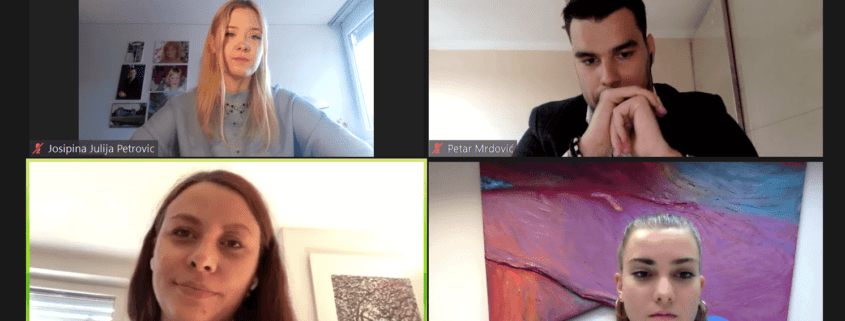On Friday, May 21, the students of the Student Community of Ljubljana organized an online conversation “Students of the European Union”. Besides the MEP Irena Joveva, Nastja Orel, a member of the Committee of the European Youth Parliament Slovenia, and Petar Mrdović, a youth delegate of the Republic of Slovenia to the Council of Europe, also took part in the discussion. They spoke about the European Union, internship opportunities and awareness-raising among young people.
In the beginning, they touched on the most current issues – the forthcoming Slovenian Presidency of the Council of the European Union. MEP Joveva explained to the students what the presidency of the EU Council means: “The six-month presidency of the country holding the presidency brings some advantages and opportunities but it also a kind of privileged access to information. Although the country must, of course, be neutral and impartial in negotiations, it can nevertheless use this presidency to highlight certain priorities. During this time, Slovenia will become a center where meetings at all levels will take place.” She expressed the expectation that the current Slovenian government would not use the presidency to pursue ideological or party interests. She wishes that this presidency is carried out successfully by Slovenia, so that after it “we won’t be shaking our heads even more as we are now”.
Ms. Joveva said that we see the advantages of membership in the Union if we compare Slovenia with, for example, any country in the Western Balkans: “Leaving aside the economic benefits, we have better environmental and food standards because we are part of the Union. Free movement of labor, goods, services, capital. Greater social protection, protection of human rights and protection of minorities and vulnerable groups. If we look from a completely practical point of view, there is also the use of mobile devices and mobile data. Using them in another member state is completely self-evident to us and we do not care if we travel because the price is the same everywhere as it is at home.”
Joveva also pointed out that the peers of young people in the Western Balkans have a more difficult access to youth programs such as Erasmus+ and the European Solidarity Unit as well as to internships in European bodies. “There is really tremendous potential for various internships but at the same time the competition is great. Young people from the EU, as well as more widely, are applying for internships in all EU institutions and agencies. All internships are published on the epso.europa.eu portal. They can be shorter or longer, lasting a maximum of six months, but unfortunately at the moment, due to epidemiological measures, young people do not get a completely authentic experience.”
The MEP advised young people to take advantage of these opportunities and to take part in Erasmus+ exchanges, as they would gain different knowledge and insights into working at the European level. Ms. Joveva herself has open places for internships but unfortunately, due to the current situation, only one intern has been working in her office for now, and even that in epidemic-appropriate conditions, when the European Parliament was almost a ghost town. “As soon as the normal way of working is established, we will continue with the internship and anyone will be able to apply. Preference will be given to young people who have not had a similar experience yet.”
Next, there was a discussion of raising young people’s awareness of the EU and the work of its bodies. “Those of you who have organized this conversation and those who are listening are involved and are already aware of the importance of being informed. We need to address and include those who are not here today.” Joveva sees the best way to raise awareness through social media, as young people use these platforms on a daily basis. She also believes that the manner of communication is crucial. “Topics should be explained in the simplest possible way. If I were to write, “I was at a trialogue on ESC today” under a post, I would not say much. It is necessary to simply clarify what a trialogue (negotiations) is and what the European Solidarity Unit (ESC) is. Even through projects such as the MEP’s diary, I try to explain European issues in a simple way, in understandable language. I insist that if you can not tell the essence of some of the most complex topics in one minute or one page, you have not prepared yourself enough or you are not familiar with it well enough.” The MEP confided to the students that she would rather work on her own posts on social networks, and that these were in fact her texts, even though she did not publish them every day. She finds it crucial that politicians are honest and not patronising in raising awareness.
In the end, Joveva gave the students a sincere piece of advice: to be curious. “Ask questions and stay active. Raise your awareness by critically reading various portals and use sound consideration. If something you read sounds too good or too simple to be realistic, then it is definitely fake news. The future is in your hands!”



Leave a Reply
Want to join the discussion?Feel free to contribute!